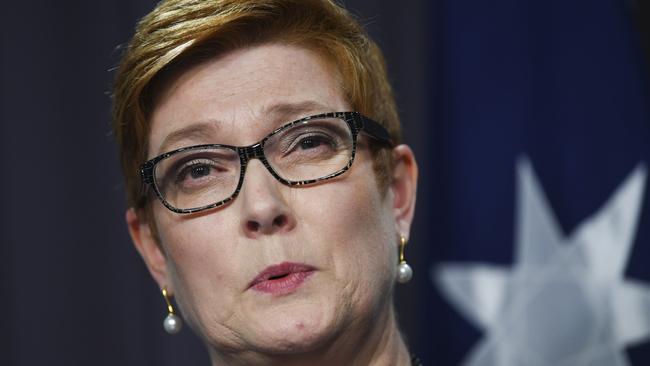Coronavirus: Consular staff recalled as ‘don’t travel’ edict issued
At-risk Australian diplomats, non-essential embassy staff and the families of overseas-posted personnel have been offered voluntary evacuations back to Australia.

At-risk Australian diplomats, non-essential embassy staff and the families of overseas-posted personnel have been offered voluntary evacuations back to Australia, after Scott Morrison issued an unprecedented “do not travel” warning covering the entire globe.
Australian government-funded aid workers will also be given the option of returning home, as authorities consider putting development programs on hold.
Foreign Minister Marise Payne said the decision was made “in light of the fast-evolving situation, pressures on health systems globally and tightening border restrictions”.
“The decision is consistent with our latest travel advice encouraging Australians overseas, who wish to return home, to do so as soon as possible by commercial means, and our broader advice to all Australians not to travel overseas at this time,” she told The Australian.
The Prime Minister announced new Level 4 travel advice — the highest possible alert level — on Wednesday morning, telling Australians not to travel outside the country under an “indefinite ban”.
Australians who defy the warning won’t be able to rely on government help if they get sick or stranded overseas.
“We are upgrading the travel ban on Australians to Level 4 for the entire world,” he said.
“That is the first time that this has happened in Australia’s history. For those who are thinking of going overseas in the school holidays, don’t. Don't go overseas.’’
The advice, together with inbound restrictions on citizens of China, Iran, Korea and Italy, will bring international travel to a virtual standstill.
According to the Department of Foreign Affairs’ Smartraveller website, those who ignore the Level 4 travel warning will be at “extreme risk”.
It says Australians already overseas who wish to return to Australia should “do so as soon as possible by commercial means”.
“If you get into trouble, the Australian government may be unable to help. In most cases, our ability to provide consular assistance in these destinations is extremely limited,” the website says.
“If you die overseas in a ‘do not travel’ destination, it’s unlikely your travel insurance will cover you. Your family will be left to deal with your death.
“This includes organising your funeral and bringing back your remains. They may also have to resolve legal or financial issues in the destination, and in Australia.”
Nearly one million Australians a month travelled overseas in 2018-19, while about one million Australians live overseas.
The travel warning follows Qantas’s decision to axe 90 per cent of international flights, and Virgin Australia’s move to suspend all of its international routes.




To join the conversation, please log in. Don't have an account? Register
Join the conversation, you are commenting as Logout